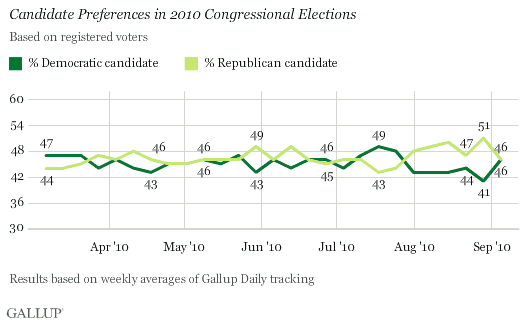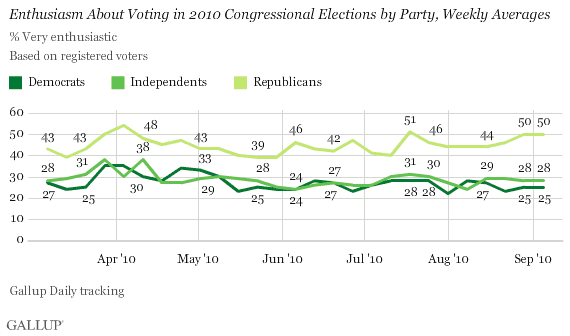PRINCETON, NJ -- Republicans and Democrats are tied at 46% among registered voters in Gallup's weekly tracking of congressional voting preferences, marking a shift after five consecutive weeks in which the Republicans held the advantage.

These results are based on aggregated data from more than 1,650 registered voters surveyed Aug. 30-Sept. 5 as part of Gallup Daily tracking. The results reflect more competitive voting intentions than has been the case recently. Republicans' leads over Democrats among registered voters in three of the previous four weeks were the highest Gallup has measured for this midterm election campaign, and higher than any GOP advantage Gallup has measured in a midterm election year since 1942.
Last week marked the return of President Barack Obama from his 10-day vacation, and included his national address to announce the official end of combat operations in Iraq. The president's three-day job approval rating rose to 47% for Aug. 29-31 -- a level it had reached only once since mid-July. Last week also brought media commentary in the aftermath of conservative talk-show host Glenn Beck's massive rally in Washington, D.C. It is not clear if these or other factors affected Americans' voting preferences as measured by the generic ballot.
Whether the 2010 race has shifted more permanently to a more competitive positioning will be apparent in the coming weeks. Nevertheless, even the current tie in the generic ballot among registered voters points to a better year for Republicans than for Democrats, given the GOP's usual advantage in voter turnout in midterm elections.
Republicans Maintain 25-Point Lead on Enthusiasm
There has been no change in the advantage Republicans hold over Democrats on motivation to vote in the fall elections. Republicans remain twice as likely as Democrats to be "very enthusiastic" about voting, tied with the previous week's measure as the largest such advantage of the year.

Recent Gallup research has shown that Republicans, and conservative Republicans in particular, have given much more thought than Democrats to the upcoming congressional elections, another key measure of turnout used in Gallup's likely voter modeling. Conservative Republicans currently score at a historically high level on this measure.
Bottom Line
The latest Gallup update on 2010 voting preferences marks the first time in over a month at which Republicans have not held an advantage among registered voters on Gallup's weekly generic ballot update. This shift, coupled with the fact that Democrats led on the measure earlier in the summer, shows that voter sentiments are not immune to change. Hoping to prove this, Democrats from the president on down are gearing up to maximize their chances of keeping party control of the House, just as voter attention to the campaign is increasing after the Labor Day weekend.
Results are based on telephone interviews conducted as part of Gallup Daily tracking survey Aug. 30-Sept. 5, 2010, with a random sample of 1,651 registered voters, aged 18 and older, living in all 50 U.S. states and the District of Columbia, selected using random-digit-dial sampling.
For results based on the total sample of registered voters, one can say with 95% confidence that the maximum margin of sampling error is ±4 percentage points.
Interviews are conducted with respondents on landline telephones and cellular phones, with interviews conducted in Spanish for respondents who are primarily Spanish-speaking. Each daily sample includes a minimum quota of 150 cell phone respondents and 850 landline respondents, with additional minimum quotas among landline respondents for gender within region. Landline respondents are chosen at random within each household on the basis of which member had the most recent birthday.
Samples are weighted by gender, age, race, Hispanic ethnicity, education, region, adults in the household, cell phone-only status, cell phone-mostly status, and phone lines. Demographic weighting targets are based on the March 2009 Current Population Survey figures for the aged 18 and older non-institutionalized population living in U.S. telephone households. All reported margins of sampling error include the computed design effects for weighting and sample design.
In addition to sampling error, question wording and practical difficulties in conducting surveys can introduce error or bias into the findings of public opinion polls.
For more details on Gallup's polling methodology, visit https://www.gallup.com/.
